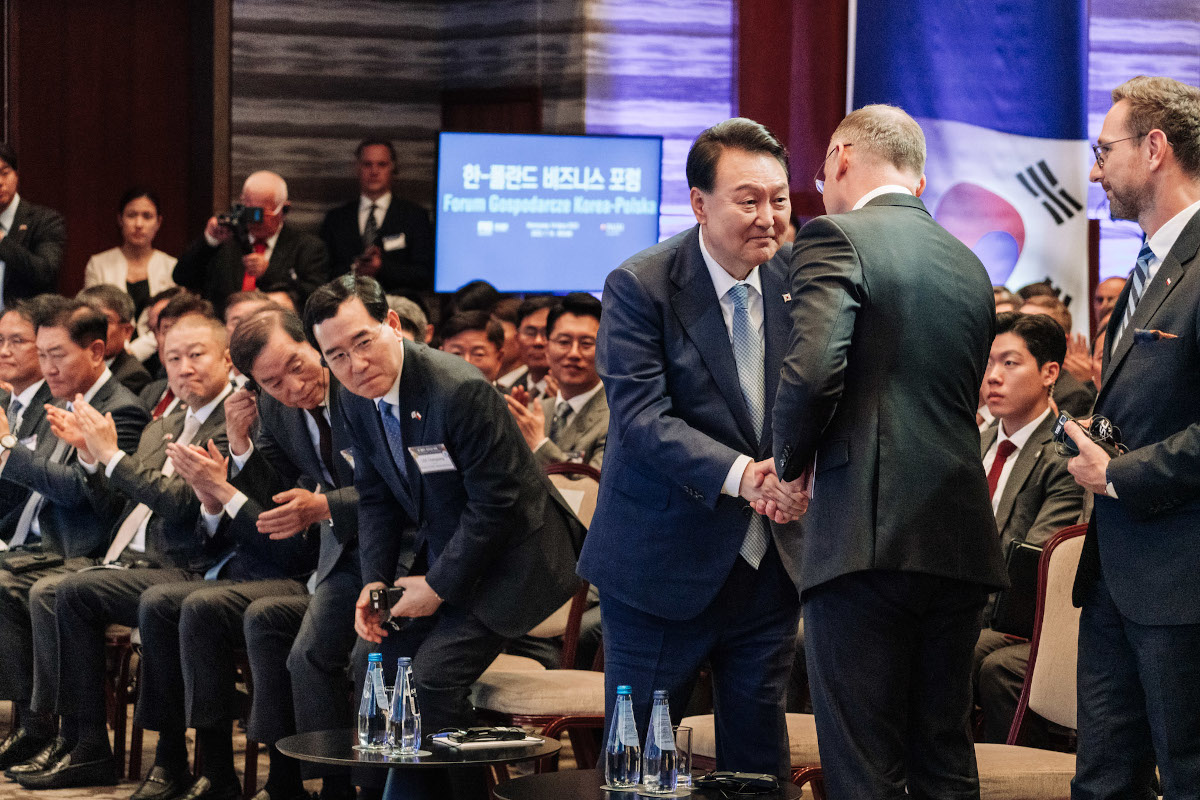Poland and South Korea move towards closer economic ties
Polish President Andrzej Duda told participants at the Polish-Korean Economic Forum in Warsaw on July 14 that South Korea is Poland’s strategic partner and that Warsaw and Seoul would build closer economic ties.
“I am counting on a greater presence of Korean investors in Poland,” Duda said.
“Poland attaches great importance to cooperation with the Republic of Korea, which is our strategic partner. Together, we are implementing more and more ambitious economic projects, also in the defense sector, aimed at strengthening Poland’s security,” said Duda.
South Korea is the second largest non-European foreign investor in Poland after the US. In 2022, Polish-Korean trade turnover reached a record $10 billion.
The event was part of the visit of South Korean President Yoon Suk-yeol to Poland. The Korean side was represented by over 80 entities: large, medium and small companies, public institutions and economic associations. Over 200 entrepreneurs were invited from the Polish side.
“I hope to increase the frequency of flights of LOT Polish Airlines connecting our countries. With satisfaction and gratitude, I note the announcement of the launch of a direct air connection from Wrocław to Seoul from November this year. Direct air connections are an important factor facilitating economic cooperation,” Duda said.
There are about 550 companies with Korean capital registered in Poland, half of which are located in Lower Silesia. In June, the long-awaited production of polypropylene was launched at the Polimery Police plant near Szczecin. This is one of the largest industrial investments in Poland in recent times and the largest investment of this type in Central and Eastern Europe. The plant in Police was built by the Korean company Hyundai Engineering.
The president spoke also of Warsaw’s expectations in terms of exports of food products.
“I am counting on the opening of the Korean market for Polish food products. Poland is a leading producer of high-quality food – including many categories of fresh fruit and vegetables. We want to relax the rules of access to the Korean market and we count on cooperation with the Korean authorities in this respect,” said the president.
Agreement on cooperation in green hydrogen
H2Korea, an agency promoting the hydrogen industry in Korea, and the Hydrogen Poland Association said they would start bilateral cooperation in the development of a renewable (green) hydrogen ecosystem and signed a Memorandum of Understanding at the Warsaw forum.
“Poland is strong in the petrochemical industry (including fertilizers), which needs a lot of clean hydrogen. It will be needed in the decarbonization of the entire economy. Korean companies think about hydrogen in the context of transport (railways, trams), as well as heavy industry, shipbuilding and sea transport. Tightening cooperation between Poland and Korea will contribute to the development of the hydrogen economy in both countries,” said Jaedo Moon, President of H2 Korea.
“Cooperation is entering a new field – decarbonization with renewable hydrogen. We will work together to strategically develop a hydrogen ecosystem for both countries to meet the growing demand for hydrogen in the energy sector. Hydrogen Poland also represents a perspective broader than the national one. Being one of the founders of 3 Seas Hydrogen, a hydrogen agreement bringing together the countries of Central and Eastern Europe, it is the voice of our region on the international arena,” said Tomoho Umeda, Vice President of HP.
Small nuclear reactors
“We are talking with South Korea about further areas of cooperation, including small nuclear reactors (SMR),” said Poland’s Minister of State Assets Jacek Sasin. “We want to have access to Korean know-how and modern technologies,” he added.
Sasin talked with South Korea’s Minister of Trade, Industry and Energy, Lee Chang-Yang, on the progress of work on the construction of a nuclear power plant in Poland in cooperation with the Korean partner Korea Hydro&Nuclear Power (KHNP).
“We also talked about further possible areas of cooperation, also small nuclear reactors,” said Sasin.
Sasin added that apart from the US, South Korea is Poland’s most important strategic partner in areas such as energy security, military security, and also large infrastructural projects. He noted that the partner for Poland’s ambitious airport project, the CPK, is Incheon Airport, the main airport near Seoul.
Banks sign agreement
During tyhe forum, Bank Gospodarstwa Krajowego (BKG) signed a Memorandum of Understanding with two South Korean government financial institutions. They plan to cooperate in areas such as infrastructure, industrial development and renewable energy.
The tripartite document was signed in Warsaw by Bank Gospodarstwa Krajowego (BGK), the Export-Import Bank of Korea (KEXIM) and the Korea Trade Insurance Corporation (K-SURE).
BGK, KEXIM and K-SURE also want to jointly seek financial support for export projects of both South Korean and Polish companies.
The document also mentions the co-financing of projects that will benefit Poland and neighboring countries. This includes reconstruction and modernization projects after the end of the war in Ukraine.
“I am convinced that the projects co-financed by our institutions will strengthen economic relations between Poland and South Korea. They will also contribute to faster, international development of enterprises from both countries. I believe that our cooperation will also have a positive impact on the development of Central and Eastern Europe, including the Three Seas region. In this way, as a Polish development bank, we fulfill our mission, which is to increase the level of competitiveness of the Polish economy and internationalization of Polish companies,” said Beata Daszyńska-Muzyczka, President of BGK.
Transport agreement signed
An agreement on cooperation in the development of transport infrastructure was signed on July 13 at the Presidential Palace in Warsaw. The ceremony was attended by Duda and Yoon Suk Yeol.
Stimulating the effective development of the necessary transport infrastructure in Poland and other regions of Central and Eastern Europe is one of the goals of the Polish-Korean agreement signed by Minister of Infrastructure Andrzej Adamczyk and Minister of Land, Infrastructure and Transport of the Republic of Korea Hee-Ryong Won.
“The signed agreement between Poland and South Korea is not only the crowning achievement of our joint efforts, but also opens the door to a new era of transport infrastructure development. I am convinced that together we are able to build solid ties between our nations, increasing mutual understanding, cultural exchange and long-term partnerships,” said Adamczyk.







